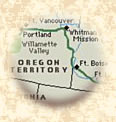
 |
| Project Overview | Teaching Ideas | Teaching Tips | Download Page |
|
| Identities
Divide students into groups (four-five students) to simulate a wagon family. Each family will choose a family name and each student will choose an individual identity. The group will decide the details of their family relationships. |
Have each group select their
identity from the family identities list. They will work and make decisions
together as they travel the trail with the FATES.
We chose female names for this project because we wanted to look at history through "fresh eyes." Discuss the identities— where did the women came from; what kind of lives did they lead; will looking at history through women's eyes change our understanding of our collective past? Remind students that these were real people who emigrated west. Time and resources permitting, they may wish to find the the diaries written by this person (library or internet research will yield most of them). Have individual students develop a personal identity which they will share, then revise cooperatively with their "family". Have students draw or write a description for their identity (name, age, occupation, past experiences, family role, appearance, personality traits, aspirations, hopes, dreams, etc.) They may try to investigate their true heritage and make-up the missing pieces or can let their historical imagination run free! |
|
|
|
| Supply List Download the supply list and the Supply Ledger. During the first week student families buy their wagon and supplies. In the weeks following, they can use the ledger to track their expenses. Except for a few instances, the fates do not rely on a stipulated supply list. |
Discuss the list of supplies making sure
students understand the importance of these supplies as well
as how they were used.
The provided supply list was compiled from the general lists of supplies most often found in historical refrence to this period. Students may add to the list but must be sure they have enough food supplies for the trip. (when adding items, consider quantity, weight, room etc.) The Emigrants' Guide to Oregon & California, recommended 200 lbs. of flour, 150 pounds of bacon, 10 pounds of coffee, 20 pounds sugar, 10 pounds salt, and these additional supplies: chipped beef, rice, tea, dried beans, dried fruit, baking soda, vinegar, pickles, mustard and tallow. While it is critical that students understand the importance of an adequate store of supplies, teachers may design their own Supply List and allocate supplies to families through teacher created Travel and Fates. A great deal of fun and added incentives for superior work can be built in this way...a good strategy to try with older and younger students. |
|
|
|
| Budget |
Pioneers needed cash or trade commodities to pay expenses while on the trail and to set up their new life once they reached their destination. Pioneers purchased supplies and livestock enroute, and paid fees for using toll roads, bridges, ferries, etc. Poor farmers often had very little cash, while storekeepers and professional families may have had a great deal of money. Student "wagon families" need $200-$600 to buy necessary supplies and replace stock animals while "traveling". You may want to create a budget sheet in math and regulate spending this way. You can allow students to "earn" money by family group, based on criteria you establish. Or, you may assign each family a different amount of money based on the occupation of the "head of household." You may also allocate the same dollar amount to every wagon family. The Travel and Fates do not require any forfeit of money, but do require adequate supplies in student wagons. |
|
|
|
| Estimate of Class Time Needed | Elementary If yours is an elementary classroom, you may wish to make this event your entire daily curriculum. Integrate math, social studies, language arts, science, and P.E. through the theme of "Pioneers," or the "Old West," or "Westward Expansion." Use the wide range of curriculum guides available to teachers for additional teaching and learning ideas. Middle School All Grades |



